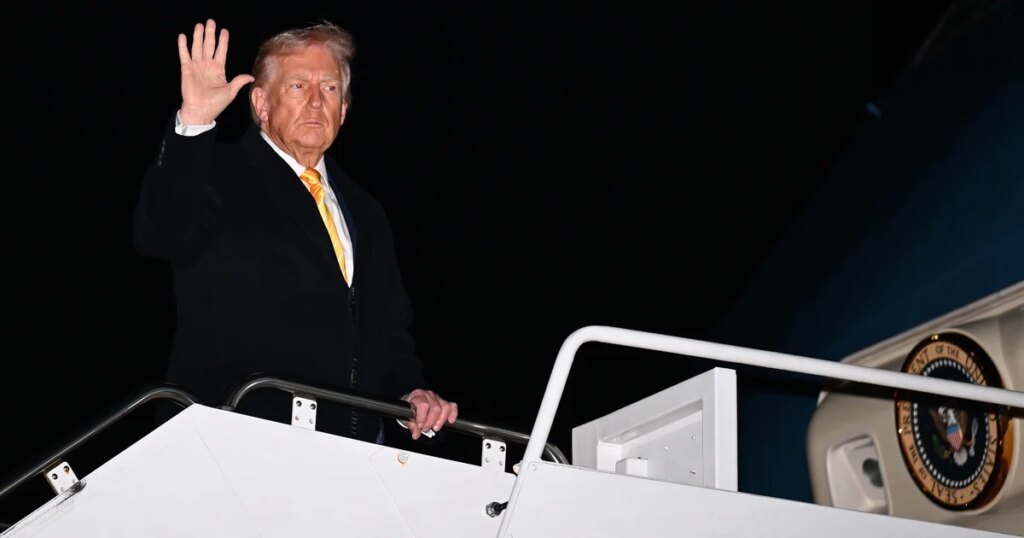As tensions escalate in Venezuela, President Trump indicated that he has largely decided on the U.S. administration’s strategy regarding potential military operations in the Latin American nation. In a recent conversation aboard Air Force One, he hinted at undisclosed next steps, shedding light on ongoing discussions among top officials. The administration’s focus on military options comes amid fresh allegations against Venezuelan President Nicolas Maduro regarding drug trafficking and ties to criminal organizations.
| Article Subheadings |
|---|
| 1) President’s Indications on Military Operations |
| 2) Key Officials in Discussions |
| 3) Allegations Against Maduro |
| 4) International Reactions to U.S. Actions |
| 5) Military Preparations in the Region |
President’s Indications on Military Operations
During a flight aboard Air Force One, President Trump informed CBS News that he has “sort of” made up his mind about the U.S. strategy with respect to Venezuela. While the specifics of the plan remain undisclosed, the president emphasized that he cannot reveal the details of U.S. intentions at this moment. This statement comes as the Trump administration weighs various military options as it grapples with the ongoing crisis in Venezuela. The president’s vague remarks suggest that he is carefully considering potential next steps while maintaining a degree of strategic ambiguity.
Key Officials in Discussions
On Friday, top Trump administration officials convened for the third consecutive day at the White House to deliberate the military options concerning Venezuela. Among attendees were high-ranking individuals, including Vice President JD Vance, Defense Secretary Pete Hegseth, Chairman of the Joint Chiefs of Staff Dan Caine, and Secretary of State Marco Rubio. These discussions are rooted in ongoing daily intelligence briefings. The details of what transpired in these meetings have been closely watched given the strategic implications of any U.S. military action in Venezuela.
Allegations Against Maduro
The U.S. government has accused Venezuelan President Nicolas Maduro of collaborating with armed criminal gangs responsible for trafficking drugs into the United States. These allegations claim that Maduro is complicit with these groups, which he has categorically denied. Recent military operations have targeted alleged drug vessels, which the U.S. asserts are linked to the Maduro government. Over the past two months, U.S. military actions have destroyed at least 21 vessels believed to be transporting narcotics, resulting in at least 80 fatalities among suspected traffickers.
International Reactions to U.S. Actions
The international community has expressed concerns over U.S. military operations in the region, particularly from Western allies. Earlier this week, French Foreign Minister Jean-Noel Barrot stated that the U.S. strikes violate international law, underscoring fears regarding the implications of U.S. engagements. Barrot highlighted that these military operations contravene the laws of the seas and expressed France’s apprehensions due to its territorial presence in the Caribbean, where many French nationals reside. This reaction illustrates the potential for global diplomatic ramifications stemming from U.S. actions in Venezuela.
Military Preparations in the Region
In line with escalating tensions, the USS Gerald R. Ford carrier strike group has arrived in the area of responsibility for U.S. Southern Command, which oversees military operations in both the Caribbean and South America. This naval deployment comes amid increased military activity, as the strike group joins a convoy of destroyers, warplanes, and special operations assets already present in the region. Such a show of force raises questions about the seriousness of U.S. military intentions and adds a layer of complexity to the ongoing situation in Venezuela.
| No. | Key Points |
|---|---|
| 1 | President Trump has indicated that he has mostly decided on U.S. military strategies regarding Venezuela. |
| 2 | Key officials, including Vice President JD Vance and Defense Secretary Pete Hegseth, are part of ongoing discussions about military actions. |
| 3 | The U.S. government has accused President Nicolas Maduro of links to drug trafficking, which he denies. |
| 4 | International voices, including France, have raised concerns about the legality of U.S. military operations. |
| 5 | The USS Gerald R. Ford carrier strike group has been deployed to the region, enhancing military presence. |
Summary
The current situation reflects a precarious balance of U.S. military readiness and international scrutiny concerning actions against Venezuela amidst serious allegations against its government. As President Trump prepares to reveal further details about U.S. strategies, the outcome could have lasting impacts not only within the region but also on international diplomatic relations. The presence of a formidable military force adds urgency to the situation, highlighting the potential for increased involvement in one of Latin America’s most critical crises.
Frequently Asked Questions
Question: What are the primary allegations against Nicolás Maduro?
The U.S. has accused Venezuelan President Nicolás Maduro of collaborating with armed criminal gangs involved in drug trafficking into the U.S., allegations he has vehemently denied.
Question: What prompted the U.S. military operations in the region?
U.S. military operations have been carried out in response to alleged drug trafficking by vessels connected to Venezuelan criminal organizations, which the U.S. claims are linked to Maduro’s government.
Question: How are international bodies responding to U.S. military actions?
International reactions have included criticisms from Western allies, notably France, which has contended that U.S. military operations violate international law.
